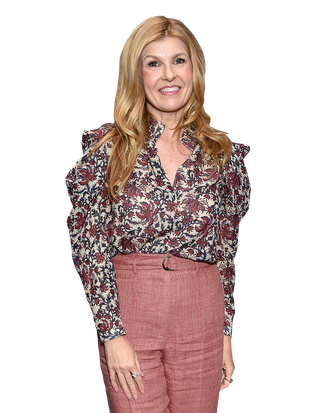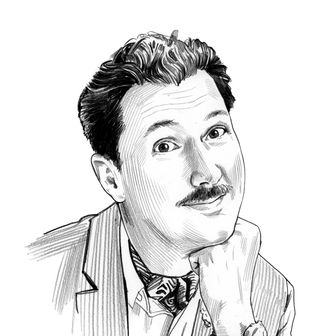
Last winter, the LA Times’ podcast Dirty John has everyone obsessed with the grim tragedy of Debra Newell, a successful Orange County interior decorator who fell for man named John Meehan. Just two months after meeting John, she married him and he subsequently took her for a bunch of cash, fractured her relationship with her three adult children, and put her entire family in peril.
The podcast was such a phenomenon, Bravo quickly ordered a limited series based on the podcast and tapped national treasure Connie Britton — known for her stellar work in Friday Night Lights, Nashville, and American Horror Story — to play Debra. In an interview with Vulture ahead of Dirty John’s finale this Sunday, Britton says she was fascinated by the story both because of what it taught her about women like Debra, and because of what it says about where women are in America today. “We are at a crossroads as women right now,” she said. “I’m curious about the ones who are the holdouts who don’t want to go there.”
I’m going to ask my most superficial question first: How did you feel about Debra’s cheap wig? I have a lot of opinions about the wig.
[Laughs.] Well, the point was that no one would know it was me. She wasn’t going for glamour!
How did you first come across the role of Debra?
I first heard about the podcast from friends of mine who were obsessed. It was one of those things that was fortuitous — they were talking about it on a Tuesday, and on Thursday, I got an email from my agent saying, “Have you heard about this podcast Dirty John?” Of course, I was like, “Yes.” I was interested even though I didn’t know the podcast.
I then read all the LA Times articles and listened to the podcast. Unlike many other people, I totally understood where she was coming from. I was interested in exploring where she came from. I wasn’t so quick to judge her or blame her. It’s easy to blame the victim and that wasn’t my impulse at all. I was much more interested in what shaped her into this very complicated woman who was vulnerable to a man like that coming into her life.
What do you think Debra fell for John?
We’re all shaped by many things in our lives — our families, the culture we grew up, specific traumas, our religious beliefs if we have them. But as women in particular, we have a history of a set of values and understandings of what we’re supposed to be to a man. That history is very deep and very old. It still exists for a lot of women, particularly for someone of Debra’s generation. She’s a modern woman and self-made and a very successful businesswoman, but she carries these old beliefs that she needs to take care of people, that she is most valuable when she is taking care of a man, and that she needs to give him the benefit of the doubt. These are not things specific to Debra. These are varying ideas that have been passed down to women for decades and decades.
And then, the very specific things that happened to her sister, where she was shot in the head by her husband — which was a major trauma for Debra — and then the mother forgives the husband. That is a great example, to some degree, of the man was valued more than the woman. That is deep. She had a lot of guilt about not being able to forgive that man.
Do you think that Dirty John dismantles those ideas about women?
In terms of the culture, I don’t know. My hope, when we started doing it, was that we could break it down and demonstrate these things enough for women that they might recognize Debra in themselves and ask questions they’ve never asked themselves before. That’s an idealized hope. Whether we accomplished that or not, I don’t know. I hope at least it makes women question their own values and think twice before assuming they should honor the man, as it were.
In terms of Debra, she learned a lot from the experience and she’s doing a lot of work now to help women who have fallen under coercive control, which is a very real, very tangible issue. I know for sure that she is going to think twice before getting married again. It’s a hard way to learn a lesson.
What were the hardest scenes for you to play?
There were a few places where we strayed from what actually happened in the podcast, for instance all the rehab stuff [where Debra helps John kick heroin]. Those scenes were harder for me. I was trying to be really true to the complexity of Debra’s decision-making and why she accepted him back into her life. That was challenging.
John is really scary on screen. Were you scared during filming?
Not really. I mean, yes, in the moment, but I was never scared of Eric Bana. I was never scared of Eric. Come on!
I love that scene where they’re in her closet and she just looks at John and says, “Move.” And he finally moves out of her way.
That was the closest I was to really feeling fear, because that was a scary moment for her. Even while we were shooting it, I didn’t know what he was going to do, which is what we were going for. But, yes, in the context of filming, there was a safety net.
What was it like when you met the real Debra?
It was fantastic. I find her so fascinating and she was incredibly warm and helpful. I met with [her daughter] Terra as well, so I got to see them together and how they interact. It was really wonderful to have her be so forthcoming with her own experience and vulnerability.
In the show, Debra is both passive and manipulative at the same time. How did you find that balance?
One of the things I find interesting about human nature, and particularly about being a woman who has been brought up in a very conventional way or lived in a conventional way, sometimes the only way to get around a lot of the conventions that we are given as women is to manipulate. Women can become very good at it because it’s a matter of survival. There is also a healthy dose of denial that helps sustain a certain belief system. A combination of those two things really come into play when we’re trying to uphold a certain ideal that isn’t really real.
You’re also play Roger Ailes wife, Beth, in an upcoming movie. Are there similarities between her and Debra?
There are. I thought about it because I started doing the Roger Ailes movie the week after I finished doing Dirty John, so it was right into it. It felt a little schizophrenic, but I found these similarities between them. There is something interesting to me about where we are in the culture right now and about exploring women like these who get into relationships with men who are abusive or problematic in these very specific ways.
I love playing powerful women, the women who are out there defying the traditions that have been handed down to them. But I also think it’s important to understand the women who, for the life of them, are going to hold onto those traditions and conventions. If you look at the presidential election, the number of women who could not bring themselves to vote for a woman — there is something deeper there. We are at a crossroads as women right now. I’m curious about the ones who are the holdouts who don’t want to go there.
I have no judgment. I think both of these women are really powerful in their own ways and very interesting and accomplished and complicated. I want to understand them better. They represent a big population of the women in the United States.
What do you think you’ve learned about those kind of women from playing these two specific characters?
Their values are traditional. There is something that feels very true to them about the conventions that they grew up with. For them, that is their truth. That’s powerful. I think it’s easy in this day and age to say they’re just oblivious or they’re just not powerful ot they’re not pushing themselves as women. I think they’re making a choice that feels right for them. Whether it’s conscious or unconscious, it’s what is true for them.


